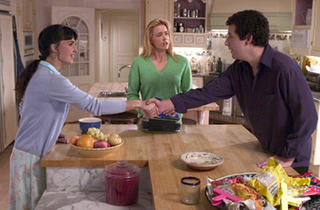 Spanglish is one of those movies you finally get around to seeing and then want to watch three times in order to actually comprehend the depth of its meaning. And that's a complement, coming from me, who hates seeing even my favorite movies more than once a year. Its uncanny blend of levity and profundity, banality and drama, love and loathing had me intrigued and captivated from the start.
Spanglish is one of those movies you finally get around to seeing and then want to watch three times in order to actually comprehend the depth of its meaning. And that's a complement, coming from me, who hates seeing even my favorite movies more than once a year. Its uncanny blend of levity and profundity, banality and drama, love and loathing had me intrigued and captivated from the start.The the opening scene of Spanglish is indicative of the rest of the film (not the introductory scene, but the next one where we actually meet the characters). In this scene a Mexican mother's husband has just his wife and daughter. So many elements in this scene are just plain goofy--the front door of her house looks like a kitschy Mexican restaurant; her overacted attempts to stop crying look like a comedy routine; not to mention the stunning Paz Vega, a Spanish actress best known for her NC-17 rated Sex and Lucia, portraying a dirt poor mother. Yet, somehow, the scene has poignancy, so that you don't know whether to laugh or cry. Watching Spanglish is a experience in cognitive dissonance, and, somehow, that's a good thing.
The writer/director/producer(/dictator) of the film is James L. Brooks, whose previous work on "The Simpsons" and As Good As It Gets I greatly admire. But don't expect the in your face humor of "The Simpsons" from Spanglish. The jokes in this movie are more in line with the subtler stuff of that animated sitcom, so watch carefully and you'll get some great laughs
Adam Sandler's character is the exact opposite of Homer or Melvin. He's a laid back chef--his greatest fear is a 4-star rating--whose wife hires Vega to be their housekeeper. Tea Leoni, who plays Sandler's wife, deserves special mention. The woman is all the worst stereotypes of 'soccer mom' rolled into one pitiable character. Sometimes after watching her in action you want to shout: "Die spawn of Satan!" Other times you just feel sorry for the poor lady and whatever made her get that way. Kudos to Leoni for doing such an impossible character convincingly.
The kids in the film were also brilliant (Shelbie Bruce, Sarah Steele, and Ian Hyland), which brings me to what I liked most about Spanglish. The kids in this film have real struggles and crises that can't be solved with sitcom platitudes, and the parents actually care about what's best for their kids. Not only do they care about them, but they are even willing to take a harder path to do what's right by their kids and families. I like a movie that preaches without preaching, and this film shows a sermon on committed parenting that most Christians would do well to take to heart.
I'd need to watch the movie three more times and really get it in order to tell you what I don't like about it. But at the risk of putting my foot in my mouth: I felt the portrayal of immigrants in this movie lacked realism and was patronizing. Having said that, I don't mean to imply that the relationship between Vaga and her daughter was cheapened, just that white guys from Jersey have trouble getting Mexicans in California. I also felt that the upper-middle class suburban stereotype was over the top.
Spanglish is a rich and complex film that has some important things to say about family and relationships. I recommend it to anybody. (Note: there is one freaky clothes-on sex scene, and one or two f-bombs; so it's not for the kiddies.) Watch it when you're in the mood for an emotionally savvy treat.
For the definition of "spanglish" click here.
For the critics take of Spanglish click here.
No comments:
Post a Comment